- Home
- Pat Conroy
A Lowcountry Heart: Reflections on a Writing Life Page 2
A Lowcountry Heart: Reflections on a Writing Life Read online
Page 2
The mourners didn’t linger, and soon it was quiet again. But not for long. Before any of the occupants of the Memorial Garden knew what was happening, here comes this big beaming Irishman, with a mess of white hair, twinkling eyes, and an impish smile on his face. He strides among them, larger than life, and calls out, “Hey, folks, I’m Pat Conroy. Now tell me who you are. Isn’t that Mr. Bradley? How many fish you caught today, sir? I promise not to put it in a book. Or if I do, I’ll change your name, and double the number of fish. Arabelle, get yourself over here and give me a big hug! And tell me where Miss Smalls got that great hat. Bet it’s got a story behind it. You know what? I’ll bet that every single one of you has a story to tell me. C’mon now, don’t be shy. No, wait—let me get a pen. I want to hear them all.”
They look at each other, rolling their eyes, and some of them cover their mouths and laugh behind his back. But when he comes back with pen and paper, dusting the dirt off his navy blue jacket, they can’t seem to help themselves. One by one, they begin to tell their stories, encouraged to go on by the gleam of excitement in his bright eyes. They talk and he writes down what they tell him, because they cannot stop themselves from doing so. Embellishing and expanding their words—their beautiful words!—he makes them come to life again, and through their stories, they live on. And as long as there are people like him to “open the light,” to share the stories with the rest of us, they always will.
—Cassandra King
HEY,
OUT
THERE
The First Letter
AN OPENING TO THE LIGHT
AUGUST 3, 2009
Hello, out there,
This is the first letter I’ve ever written for a website, modern times seem to require it of all human beings. This website was produced by Mihai (Michael) Radulescu, my agent Marly Rusoff’s partner, who spent a couple of hours explaining its intricacies and its cunning store of useless data concerning my own squirrelly life. I’m the only writer I know whose website bears the artistic mark of a native-born Romanian. The Internet remains a mystery to me as vast and untouchable as any ocean. I don’t understand it but the wizards and snake handlers who control me tell me that all this is part of the inexplicable strangeness of the world we now inhabit.
My health went south on me this spring. In the middle of May, I began internally bleeding. I took this as a very bad sign that did not bode well for a frisky old age. My wife, Cassandra, drove me to the emergency room in Beaufort where my doctor, Lucius Laffitte, met me and got me to the Medical University of South Carolina. All the nurses and doctors there were spectacular. They saved my life.
Everything that was wrong with me that night was my fault. I had tantalized the Fates by embracing that life-defying trifecta: overeating, overdrinking, and lack of exercise. I’m trying to develop the appetite of a parakeet, drink nothing stronger than Clamato juice, and try to do aerobics in a Fripp Island pool as often as I can. When I enter the pool I look as though I’m trying out for a part as Moby-Dick. It’s not a pretty sight.
The tour for South of Broad began at my house at Fripp this past week. The tour is abbreviated because of my health, which I regret. I always liked meeting and talking to you guys on the road, but that was at a time before airline travel became an American nightmare. I’ll go by car on most of the signings, and we’ll see how it goes. I’m alone in a room for most of my life, writing, and I love it when readers bring me news of the outside world. That part of my life might be coming to an end, and nothing fills me with more regret. To have attracted readers is the most magical part of my writing life. I was not expecting you to show up when I wrote my first books. It took me by surprise. It filled me with gratitude. It still does.
Yesterday, August 2, I took my agents to Charleston for a tour of the city. A young publicist from Random House, Elizabeth Johnson, went with us. She married a Marine Corps fighter pilot and they are stationed at the Marine Corps Air Station, where he is in training before shipping out to one of the war zones. I’ve always taken a childish joy in showing off Charleston to strangers in the city. Charleston never lets me down, but this time my tour of the city had an unusual twist. I showed them Charleston through the eyes of the narrator of South of Broad, Leo King. I followed Leo’s paper route through the old part of the city, showed them the high points and low points of Leo’s career as a child. I showed them the distinguished line of mansions that grace the jacket of the book. To me it composes the prettiest formation of houses in the book. We toured The Citadel and I pointed out the places I had lived when I was pretending to be a cadet. I owe The Citadel more than I can express in words. That day, The Citadel was beautiful in sunlight, and Charleston strutted in the beauty of all its strange elixirs. For lunch we ate at Magnolias; all four of us ordered seafood over grits: lobster, shrimp, and scallops with a lobster sauce. It was as good as food can get. Later I returned home. I remembered dozens of things I forgot to tell them. My new book has changed the way I see and present Charleston, and nothing makes me happier.
There are at least three books I want to write before I buy the farm, and I’ve already begun the first of those. In it, I’m visiting my real family for one final look, one last summation of all I learned from being part of that hurt and glorious tribe. I’ve written the first three chapters, and I’ll try to finish it next year.
For the second book, Nan Talese wants me to write an Atlanta novel and I told her I would do it. Because of my illness I feel a great imperative to write faster and become more prolific as I limp toward my final chapter. And the third book is a novel about the first two years of teaching at Beaufort High School, when I fell in love with all the kids I taught. My friend Bernie Schein calls them “the best years” and I look back on them as the happiest of my life. I adored those students and they seemed to like me right back.
I close the first letter with relief and some anxiety. They tell me I should do this every now and then. In some ways it seems like a nightmare for someone who never learned to type, in other ways an opening to the light.
Great love out there…
Surprises on the Road
OCTOBER 5, 2009
Hey, out there,
I returned to Fripp Island last Saturday after a driving tour around the South. It was tiring but exhilarating, and I rediscovered that I love meeting the people who read my books. They tell me stories. Some of them resurrect a past I had forgotten long ago. Citadel alumni turn out in large numbers. They tap Citadel rings with me before they leave the signing table. A grandmother who read The Water Is Wide the first year she taught English had me sign a book for her granddaughter, who had just begun her first year as an English teacher. I listened to stories of the Iraq and Afghan wars.
Because of my cookbook, people brought me pound cakes, pickled shrimp, a dozen oysters, grits, boiled peanuts, heirloom tomatoes, crawdads, and other good things to eat. In Birmingham, I spoke to a crowd after the writer Rick Bragg and my comely wife, Cassandra King, warmed the audience up. It annoyed me that both Rick and Cassandra were funnier than I was and I could not help but notice the letdown and sense of disappointment that rushed through the crowd when I got up to speak. We then had dinner at Frank Stitt’s magnificent restaurant, the Highlands Bar and Grill. Because I once wrote an introduction to one of his superb cookbooks, Frank and his staff feed me like a king whenever I am lucky enough to be in Birmingham.
In Charleston, I spoke briefly to the assembled groups and spotted Mike Mahoney, my longest-running friend in the world, grinning at me. I’ve known Mike since sixth grade, when my family moved to Culpeper Street in Arlington, Virginia. He was a great kid and proved to be a lifelong friend. His mother and two sisters were knockouts, and Mike and I were altar boys when his mom, Kitty, married the irrepressible Don Mancini. Kitty has always served as a north star in my conflicted life. The Mahoney family took me in when I was a sixth-grader and have never let me go. Mike and his wife, Rita, recently retired and moved near coastal North Carolina.
I promised to visit them soon.
My Citadel roommate, Mike De Vito, was there, and so was Dave Bornhorst, the heart and soul of my Citadel basketball team. I think I knew more than two hundred people in line and I had once asked one of them to marry me. I had met Marnie Huger when we applied for a job working with migrant workers and sat beside each other as we awaited our turn to be interviewed. She was as lovely a young woman as I had ever seen, and we dated that whole summer. Her family lived on Sullivan’s Island and I was smitten with all of them. Marnie and I went out ten or twelve times that summer and I was happy just to be along for the ride. I wanted to marry the whole family. I began teaching at Beaufort High School in 1967. I wrote a letter to Marnie in college, and I have a distinct impression that I asked her to think about marrying me. As I look back on the callow boy I was, the letter must have struck Marnie as hilarious. She wrote me a sweet letter back, telling me how much the summer had meant to her and her family. Though flattered by my offer, she suggested that I think about holding her hand or kissing her if I were serious about approaching the altar with her. At the signing, Marnie gave me a long letter that she had written me. The letter was lovely, and I shall treasure it the rest of my life.
Being inside a bookstore stimulates my desire to read, and being on tour gives me lots of time to do so. Steve Rubin sent me a copy of John Grisham’s book of short stories, Ford County, and I read it with pleasure and growing excitement. The short story seems like a majestic but difficult form to me and I had not known that John would prove so gifted in the art of the short story. I’ve known John for a while now and have read his books since he first catapulted onto the national stage with The Firm. He calls me periodically to chastise me for my occupational laziness and my shameless inability to produce a novel in this century. John works as hard as any novelist I’ve ever met, and I’ve been hooked on his books since he first started publishing with Doubleday. After admiring his short stories, I’m going to try to get him to write a book of poetry. I think he could pull it off.
Two other big boppers, John Irving and Richard Russo, have published books this season and they both burn brightly in the pantheon of writers I revere. Both these guys can’t write a grocery list without it sounding like literature. I collect the work of both men and their books have proven to me that New England is every bit as quirky, eccentric, and character-rich as the South. Margaret Atwood’s new book arrived at the house yesterday.
Last night, I finished a book, Why This World: A Biography of Clarice Lispector, by Benjamin Moser. Always, I hunt for great writers I’ve never heard of, and Clarice Lispector is considered to be one of the greatest female novelists in the history of Brazilian literature. In 1978 I got myself exposed to Latin American literature and I think it changed my life. I went through a long fruitful period when I read almost nothing else as I devoured the work of Márquez, Vargas Llosa, Borges, Carpentier, and a dozen others. If there is a better novel than A Hundred Years of Solitude, I don’t know what it is. The oddly named Clarice Lispector had avoided my detection, yet I found the story of her life both improbable and riveting. I have ordered her novels and I await their arrival.
At my writing desk, I’m reading Robert Pinsky’s new anthology of poems, Essential Pleasures. I’ve always liked Pinsky’s poetry and it’s nice to see such refined taste in his choice of other poets.
There is another book out there that I need to talk about. My daughter, Melissa Conroy, has written and illustrated her first children’s book. It is called Poppy’s Pants. The great secret of the book is I am Poppy. My first grandchild, Elise Conroy, started calling me Poppy as soon as she began to talk. There was never any indication given about where this nickname came from, but the rest of the grandchildren have picked it up. Several years ago, Melissa took a drawing of me by her daughter Lila and made a doll, a Poppy doll, for her child. The doll looks like a whacked-out sumo wrestler on steroids, but Lila carried it around with her. I told my daughter that if I thought I really looked like that doll, I’d put my head into an oven. But my other grandchildren clamored for ones of their own and a cottage industry was begun. Blue Apple Books saw the dolls at an art show in New York and asked Melissa if she’d like to do a children’s book. Melissa took a story from her own childhood and turned it into her first book.
Though I never noticed that I only wore khaki pants, my children certainly did. When Woo (my nickname for Melissa) was about five, she told me I had a hole in my khakis. She offered to sew them up for me and I accepted. When she asked me about what color she should use, I answered that I was color-blind and that I saw the world like a cocker spaniel saw it, not like a human being. Woo sewed it up using aquamarine thread because she wanted to add color to my monochromatic life. The result delighted me, and my daughters claim I wore the same khakis for at least three more years. I wrote an afterword to Poppy’s Pants and am going to sign books with Melissa in the near future. She suggested I wear khaki pants. I suggested she sew them up with aquamarine thread.
Next in line is a nonfiction book called My Reading Life, about some of the books and people that have inspired me. It has been a joy to write.
I’ve already begun work on a new nonfiction book about my family with a great emphasis on my father’s post-Santini life. My father managed to change his entire life after I wrote a novel about his brutal regime as a family man. It took resoluteness and courage for my father to change, and I need to acknowledge that. My brothers and sisters have all gotten nosebleeds and migraines since they heard news of this project. I hope to write it in a year, while taking notes on my Atlanta novel.
A woman in Charlotte approached me and said that she’s tired of the dysfunction in my novels. I told her I was sorry, but that is how the world has presented itself to me throughout my life. She told me her family was normal and they were proud of being a happy family with no clouds on the horizon. I congratulated her and told her I wished I had been raised in such a family.
Thank you for reading South of Broad. It is, as all of my novels have been, a love letter to all of you who read my books.
Great love out there…
The Fire Sermon
SPEECH BY PAT CONROY,
DELIVERED AT PENN CENTER
2010
Fifty years ago this October, Gene Norris brought me to Penn Center as a fifteen-year-old boy. The event was a community sing, and the first of the great spirituals I heard sung there was “The Old Sheep Done Know the Road.” Ever since that night I’ve always thought that black people could sing a lot better than white people. Mr. Norris took me to the events at Penn Center for the rest of my high school and college life. It was at Penn that I met Dr. Martin Luther King on a street now named for him. I also met Ralph Abernathy, Andy Young, Jesse Jackson, Julian Bond, and the entire leadership of that fabulous civil rights movement that brought the South kicking and screaming into the twentieth century. I felt a part of it because I observed some of its evolvement at Penn Center, a witness to its very creation. I watched my whole country change because of meetings that had taken place at Penn Center. I fell in love with the sons and daughters of slaves that lived on Saint Helena Island, and Mr. Norris told me I was walking amidst the first men and women ever emancipated from slavery in the American South.
Few people understood the exceptional role the civil rights movement had on the white boys and girls of the South. Bill Clinton would never have become who he was without the shining example of Martin Luther King. The same is true of Jimmy Carter and Fritz Hollings and Richard and Joe Riley. Imagine this: you’re a little white kid and you watch fire hoses turned on people who don’t seem to be hurting anyone, and fierce dogs being turned on young men who carry signs about freedom. We white kids grew up watching movies and TV and guess what we had learned to do? We had learned to tell the good guys from the bad guys. One night I found my mother weeping while watching the evening news. She was watching a news clip of the Montgomery Bus Boycott, where thousands of black men and women were walkin
g to work on the streets of that old Confederate capital. My mother was touched by the unearthly dignity of a people on the march who were fighting by refusing to fight—whose immense strength lay in their allegiance to nonviolence.
In 1962, one hundred years after the founding of Penn School, Peggy Conroy, with the help of Gene Norris, integrated the Marine Corps Officers’ Club in Beaufort. She had come to a community sing at Penn after hearing my rave reviews of those stirring performances. She was the president of the Officers’ Wives’ Club and invited the choir at Robert Smalls High School over to sing spirituals. The choir knocked the socks off those pretty Marine wives, and desegregation took another small step in the South.
When I was a sophomore at The Citadel, I received a phone call from Gene Norris asking me to infiltrate a meeting of the Ku Klux Klan. He had me call Sheriff Wallace, who told me he had received reports that the Klan was planning to incite the mob to storm out of Saint Helena’s and burn down the home of Courtney and Elizabeth Siceloff at Penn Center. Sheriff Wallace wanted me to attend the rally and call from a phone booth at a nearby cheesy motel.
“Can you pretend to be a redneck, Pat?” he asked.
“I went to Beaufort High. I’m an expert at playing redneck.”
So, I attended my first Klan meeting and milled among the white-robed figures, surprised when people started calling out my name. I met six or seven young men I had played against in football, basketball, or baseball—guys from Hampton, Edisto, Orangeburg, and Ridgeland. One guy expressed surprise at my interest in the Klan and asked me, “Pat, aren’t you a Roman Catholic?”
“C’mon, Bubba. Where on earth did you get that idea? I’ve been Southern Baptist since birth,” I lied, denying the faith of my fathers.

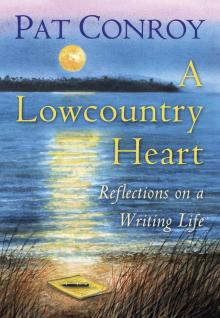 A Lowcountry Heart: Reflections on a Writing Life
A Lowcountry Heart: Reflections on a Writing Life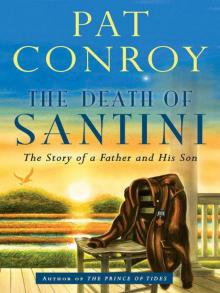 The Death of Santini: The Story of a Father and His Son
The Death of Santini: The Story of a Father and His Son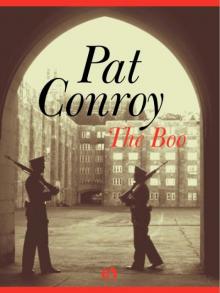 The Boo
The Boo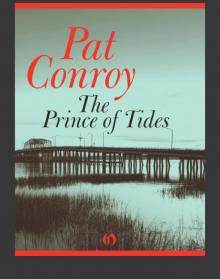 The Prince of Tides
The Prince of Tides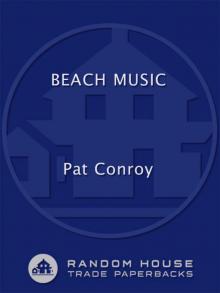 Beach Music
Beach Music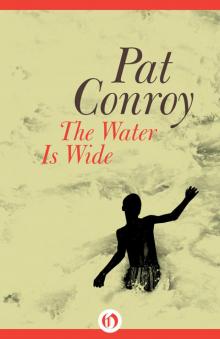 The Water Is Wide
The Water Is Wide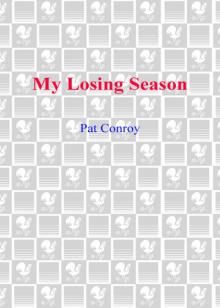 My Losing Season
My Losing Season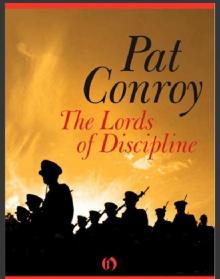 The Lords of Discipline
The Lords of Discipline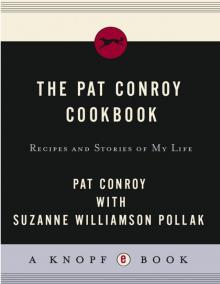 Pat Conroy Cookbook
Pat Conroy Cookbook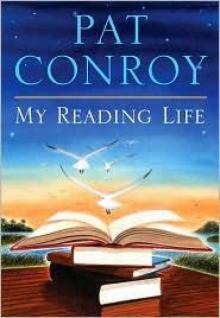 My Reading Life
My Reading Life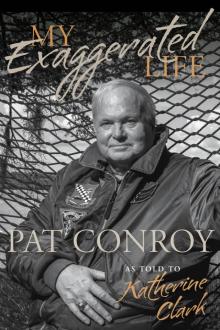 My Exaggerated Life
My Exaggerated Life The Pat Conroy Cookbook
The Pat Conroy Cookbook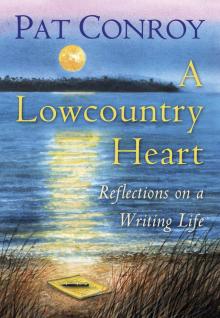 A Lowcountry Heart
A Lowcountry Heart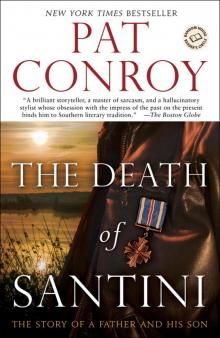 The Death of Santini
The Death of Santini